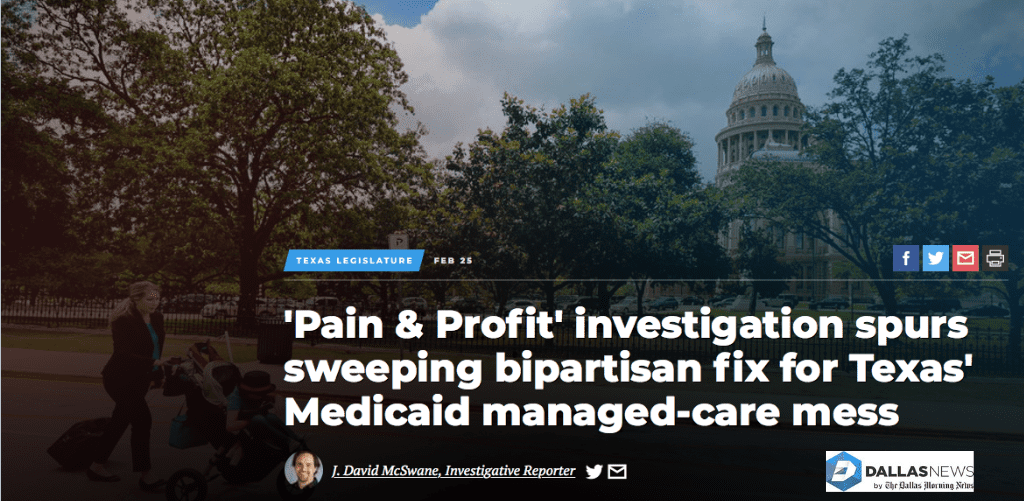Spotlight on HB 2453 by Rep. Sarah Davis
Background:
Just short of 4 million Texans receive their health care from Medicaid on any given day, including two out of every five Texas children. In the early 1990s, our state began providing care in Medicaid through contracts with health insurers, and today the Medicaid agency, the Texas Health and Human Services Commission (HHSC), has enrolled over 92 percent of beneficiaries in Health Maintenance Organizations (HMOs).
Medicaid payment rates and Medicaid Managed Care are complex, and few people or organizations have the expertise or resources to advocate for the interests of beneficiaries on a level playing field with the industries that provide medical and long-term care services or the health insurers themselves.
The Problem:
In June 2018, the Dallas Morning News began
Legislative Solution Starts with HB 2453 by Rep. Davis
April 2 will mark the first public hearing on bills filed in the 86th Legislative Session intended to address multiple problems with Texas Medicaid Managed Care operations. The most comprehensive of the bills to be heard is HB 2453 by State Rep. Sarah Davis (R-Houston), along with Medicaid Managed Care bills by State Rep. Joe Deshotel (D-Beaumont) and State Rep. Richard Raymond (D-Laredo). Advocates expect that a new “committee substitute” for HB 2453 will be presented at the hearing and that other bills, including HB 4178 by Chairman James Frank (R-Witchita Falls), may be added to a revised hearing agenda. On the Senate side, SB 1105 by Sen. Lois Kolkhorst (R-Brenham) and SB 1140 by Sen. Kirk Watson (D-Austin) will also be heard on April 2.
CPPP will testify in support of Rep. Davis’ HB 2453, with the caveat that the substitute bill version is not yet available. Below are major themes of Medicaid Managed Care reform included in the filed version of that bill that we support.
• Multiple improvements to appeals and “fair hearings” for beneficiaries when health plans decide to cut back or deny services. Beneficiaries would have a right to an independent appeal from an arbiter or review organization with medical expertise, and to have benefits continued until the full process is complete. Service denial and reduction notices must be detailed and specify exactly what medical necessity policy or standard the health plan uses to justify the reduction. Beneficiaries would be able to track the status of denials, appeals and fair hearings online. HHSC would aggregate and analyze trends in denials and reductions of care.
• Multiple improvements in tracking and public information on health plan performance. HHSC will aggregate information on beneficiary inquiries, complaints, and formal appeals from all sources including health plans, all agency divisions, and constituent complaints to elected officials. Beneficiaries could see the performance records for health plans in their own regional service area. Searchable lists of the services for which each health plan requires “prior authorization” would be online. Records of health plan denials, reductions in care, appeals, and Corrective Action Plans by health plans would all be made public, and become part of health plan report cards that help enrollees choose plans.
• Stronger monitoring of
• More support and improved policies for health care providers. A new provider ombudsman would be established, and more realistic time frames for phone conferences between an enrollee’ own doctor and health plan medical staff (“peer to peer”) would be adopted. HHSC performance metrics for hospitals related to “potentially preventable admissions and readmissions” must be adjusted to take into account the impact that Medicaid Managed Care plans’ policy and performance have on hospitalization rates. Inspector General processes must design monitoring systems to detect inappropriate “cost avoidance” denials of medically necessary care.
• Care Coordination and Special Protections. Changes to address other system failures and shortcomings include: ensuring that attorneys for children in foster care can access their medical records; parents of children with disabilities must be able to review and dispute “needs assessments” performed by the health plans; the health plan for children in foster care can no longer require prior authorization before a child’s needs for therapies are assessed; Care management and care coordination functions must use consistent definitions, and both families and health care providers must have clear guidance on what services the client can expect and be able to get a timely response from the care coordinator
• Raising the bar on quality. The advisory committee for STAR Kids (Medicaid Managed Care for children with disabilities) will continue to exist. Federally mandated “External Quality Review Organization” (EQRO) studies will examine how Texas Medicaid Managed Care plans are performing on national “core quality data” elements each year. The EQRO will also compare health plans records with respect to enrollee request for information, complaints, and appeals of health plan denials. Health plans will be required to transmit that data monthly to HHSC.
Please check back with the CPPP blog soon to read more about this and other Medicaid Managed Care bills under consideration.
